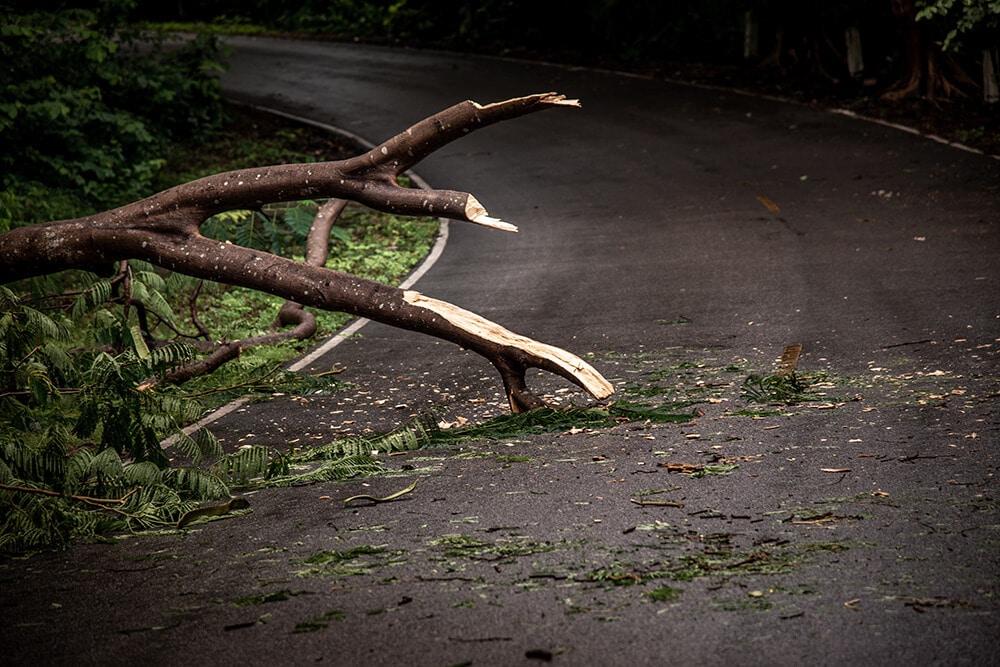Fallen trees. Fragments of broken traffic signals. Furniture that flew out of the back of a truck bed. Debris on the highway is a major hazard to vehicles barreling at speeds upwards of 65 mph toward these large objects. But reporting road debris is one of the easiest ways to help stop preventable accidents from happening.
It takes the conscientiousness of all of us to make Pennsylvania’s 120,000 miles of highways safe for everyone. In this article, we will discuss the steps of reporting debris on the highway in Pennsylvania, as well as some additional resources for keeping drivers safe. As always, please feel welcome to reach out to our law office at Shrager, Sachs, & Blanco if you have questions related to car accident law or what you should do following a collision.
Reporting Road Concerns to PennDOT
The Pennsylvania Department of Transportation (PennDOT) is the government body responsible for overseeing programs and policies affecting state transportation and roadways. One of PennDOT’s primary duties is maintaining, restoring, and improving the state highway system.
Reports of road concerns, such as debris on a highway, can be made by calling 1-800-FIX-ROAD or visiting www.penndot.gov and clicking on the “Submit Concern” tab on the homepage. You can also use this webpage to check the status of existing concerns by searching by reference number.
Remember, this method of reporting is reserved for potentially-dangerous road conditions, not accidents, disabled vehicles, or emergencies. Accidents and disabled vehicles should be reported to a local police station, or your area’s Pennsylvania county PennDOT office in non-emergency situations. In any case of emergency, call 911 immediately.
Road concerns handled by PennDOT are generally ones which match one of the following descriptions:
- Any object on the road (debris, trees, rocks, spills, mud, abandoned vehicles, etc.)
- Potholes
- Deer or other animals struck by motorists
- Fallen, damaged, or missing road signs or traffic signals
- Weather-related dangers or road damage
- Hazardous bridge conditions
- Problems with construction sites
When reporting a road concern, either by phone or online, you should have the following information to help PennDOT locate the hazard site:
- Type of road hazard being reported
- Location on a map (if submitting online)
- County
- Municipality
- Street name, route number, or state route (SR) number
- Nearest cross street or intersection
- Description of any landmarks that could help locate the problem area
- Whether the problem is on the roadside or in the lane of traffic
- A picture of the hazard (if available)
- Your contact information
Accidents Caused by Road Debris
The AAA Foundation for Traffic Safety reported that, over a four-year period, drivers in the U.S. suffered approximately 39,000 injuries and 500 deaths resulting from debris-caused car accidents. A piece of debris can cause accidents when it flies off a moving vehicle and strikes the roadway or other cars, and it can also result in accidents when left lying in the road. The following are some of the more common types of accidents caused by road debris:
- Collisions and sideswipe accidents from swerving to avoid debris
- Driving off roadways, across medians, and over guardrails
- Broken windshields and other vehicle damage
- Stalling on highways after colliding with debris
- Rear-end collisions when braking to avoid debris
- Loss of vehicle control from sudden braking
Resources for Keeping Pennsylvania Drivers Safe
Our state has some unique road conditions, and we as Pennsylvania drivers are no strangers to adverse driving environments. With an aging highway infrastructure consistently ranking among the worst in the nation, a deer population of about 1.5 million, and infamous winter blizzards, Pennsylvania roads test the mettle of any driver who takes to the often-challenging but always-scenic roads of our state. And residents of the greater Philadelphia area are accustomed to traveling a range of rural, suburban, and inner city roads, highways notorious for traffic jams, and dangerous intersections on their daily commutes. The added hazard of road debris only serves to compound dangerous driving conditions.
Planning ahead and checking road conditions before you begin your trip are National Highway Traffic Safety Administration (NHTSA)-recommended safe driving tips for drivers. The 511PA webpage or mobile phone app provides up-to-the-minute information on the conditions of more than 40,000 miles of Pennsylvania roadways. Any problematic areas will be posted to alert drivers of road dangers.
PennDOT also recommends taking extra precautions during the winter months. Pennsylvania is one of the most dangerous states for winter driving. Preparing your vehicle, emergency supply kit, vehicle tool box, and even your driveway can help prevent your car from becoming stuck or involved in an accident when treacherous weather strikes. Debris on the roadways can be especially dangerous when roads are slippery from ice and snow.
Those who notice and report debris on the highways are usually the most alert drivers. And drivers alert to changing road conditions are far less likely to be involved in an accident than a distracted or inattentive driver. Paying attention to the environment around you is one of the best ways you can keep yourself and others safe on the highways.
A skilled car accident attorney can also be a valuable resource to Pennsylvania drivers who have been involved in any type of vehicular collision. Our team of lawyers at Shrager, Sachs, & Blanco is available to meet with you and discuss the details of your case. Reach out for a free consultation.









